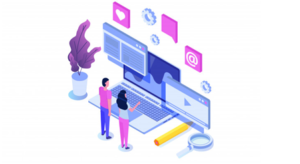
The new buzz word or do we say the old word that’s recently creating a buzz. Yes, you guessed it right! Learning Management System! In fact, 83% of organizations currently use LMS. Additionally, the global learning management system market is expected to reach a value of $23.21 billion by 2023. [Source].
Since an LMS centralizes the entire learning process and helps in saving time and costs, it’s essential to get it right. This is the reason we have come up with his 10-step checklist for flawlessly implementing LMS.
The 10-step Checklist to Implementing LMS
For easier understanding, we have segmented this checklist into three parts — Process, People, and Tools and Technology. So, let’s dive right in!
PEOPLE
- Make Decisions
While implementing LMS, you and your team will need to make several feature-focused decisions. However, you do not need to get overwhelmed. You do not need all of the features in your LMS. Therefore, kick off the process by making a list of the essential elements. Discuss with your team what you want or do not want in the Learning Management System.
- Get Your Team Members on One Page
When you get started with implementing LMS in your organization, you also need to assign different user roles within your platform, such as admins, managers, or instructors. Kick-off the process by deciding what roles different users will have in the LMS? Understand the level of access to be granted to users. When you have clarity on all of the three roles, you can then decide how they will help with the implementation and launch of your new LMS.
- Involve Your Stakeholders and Top Management
An LMS needs the management’s support. After all, they are the ones who will handle the commercial aspect. Hence, keeping the management in the loop about all the going-ons of the process is important. Again, you also have to get your stakeholders on board early on in the process.
TOOLS AND TECHNOLOGY
- Decide if You Wish to Integrate Third-party Systems
You can also consider integrating your existing systems with your new LMS — which is extremely beneficial for your organization.
- Plan Out the Structure
Learning portals consist of distinct portals, which enable one to control, manage, and disseminate knowledge to learners. There is a single top-level portal that serves as the LMS’s control room. First assign your top-level portal, and then, give it a name and brand. Finally, use it to control the rest of the portals. Please note that each portal will need to have its own admin and manager.
- Get Your Course Content Ready
Without content, you won’t have any corporate training modules, to begin with. Therefore, it is vital that you consider this aspect before implementing LMS. Decide the type of content you’re going to use.
PROCESS
- Set a Time Frame
For every process, you need to have a schedule. Therefore, decide on the launch date of your LMS. But setting this date arrives with several considerations. After considering all of these factors, make a realistic goal, and set expectations for your stakeholders. As per recent data, most corporations usually set a time frame of one to two months.
- Finalize the Key Performance Indicators
Key performance indicators AKA KPIs are vital to stick to your end objectives. KPIs measure your results, allowing you to assess performance, which can improve over time. Of course, to set your KPIs, you will need to have a record of your previous data.
- Test It
Once you have set your KPIs, picked your team, planned the portal structure, and finalized the content, your next step should be to test out the new LMS. Talk with your vendor if they conduct a test launch after you have completed the above steps of implementing LMS.
- Repeated Improvisation
Implementing LMS is just the beginning of a long and continuous process. You need to ensure that you have measures in place for continual improvement and investment in your LMS. This is necessary to ascertain that you achieve all your important KPIs.
One should not be stuck in one place. There should be efforts to evolve and expand. With the help of the above LMS implementation checklist, you are in the right direction. But this does not mean your trials end right here! After all, repeated iterations are necessary to perfect any process.

